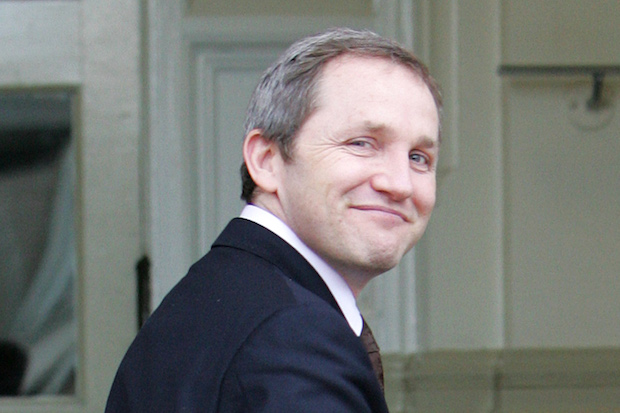Quite how one person is expected to oversee not just radio but also ‘arts, music, learning and children’s departments’ was not made clear by the BBC when it announced the stratospheric rise to power within the corporation of James Purnell as the new director of everything that’s not TV or light entertainment. You may recall that Purnell was once culture minister under the Labour government and in 2013 became head of strategy at the BBC, an appointment that at the time was excused (given Purnell’s lack of programme-making experience) by Tony Hall, the director-general, as ‘of course not editorial’. But this new job is very much in charge of overall editorial content; it signalled the departure of veteran broadcaster Helen Boaden from her post as director of radio, now seemingly superseded by Purnell’s grandiose new empire. Radio, the BBC’s most valuable asset (in cultural terms, if not financial), is now at the mercy of a man who for 20 years inhabited the corridors of Westminster and since then has been preoccupied with positioning the BBC in the new digital world rather than with what actually goes on behind the mixing desks and soundproofed walls of Broadcasting House. It makes no sense.
It’s not just that Purnell was formerly a politician, although that makes the appointment not just odd but alarming, given the BBC’s essential requirement always to be seen as independent of all political influence. It’s much more that Purnell has no editorial experience, no technical know-how, no track record in creating audio programmes. He won’t know at first-hand what it takes to make first-class radio; that it’s not just about hiring sharp-minded, inquisitive reporters and equally talented editors and producers; that time spent doing seemingly nothing can be extremely productive; that creating a collegiate atmosphere is vital; that ideas come only in a climate of give-and-take and freedom not from competition or criticism (that’s all vital) but from obfuscation, managerial manoeuvring and ‘right’ (or ‘left’) thinking. And why, if he was the right person for the job, has it been announced that there will also, at some future date, be appointed a new director of radio to replace Helen Boaden? What will the powers of that new director be? How much control will they really have? How will they ensure that the seven audio networks are free to develop their individuality and independence from each other?
It’s enough to make one bury one’s head in the ether, hoping that there’ll always be enough funding for the making of drama series like last week’s finely produced adaptation of The Forsytes. On TV back in the 1960s there was enough money to splash out on 26 hour-long episodes, dramatising Galsworthy’s epic family saga so successfully that it captured the nation’s imagination. A 1990 radio version, ‘the most expensive drama serial ever made’ because it hired stars like Dirk Bogarde and Diana Quick, ran for 23 episodes. But Radio 4 has come up with an ingenious solution to the financial demands of making such a major drama project by spreading the series over two years, broadcasting it in four distinct sections of seven episodes each, aired across a single week to intensify the drama.
Until now I’ve always dismissed Galsworthy as being too preoccupied with class and the inane social chatter of those with too much money and not enough to do. But this adaptation, by Shaun McKenna, has had enough breathing space to give us what lies behind the snobbish, clan-like Forsytes and even to feel some sympathy for Soames and his bewitching daughter Fleur. They’ve become real people, fully fleshed out, while the sound quality, the music (by Neil Brand)and sophisticated production (by Marion Nancarrow) have been so refreshing to the ear. My only regret is that we now have to wait until next year to find out whether Fleur (impeccably played by Jessica Raine) really will reform.
For more than 25 years the Libyan writer Hisham Matar has been trying to find out what happened to his father, a diplomat turned dissident, who was kidnapped in 1990 by Gaddafi’s henchmen and never seen again. Was he murdered six years later in the infamous massacre at the notorious Abu Salim prison in the suburbs of Tripoli? In The Return, Radio 4’s Book of the Week (produced by Kirsteen Cameron), Matar goes back to Libya to find out. But his book is much more than a quest for answers and/or retribution for his father’s loss. As adapted for the radio (by Anna Magnusson) it becomes a powerful meditation on family, home, and how the grim realities of Middle Eastern politics have impacted on a writer with an eloquent ability to speak for us all.
Just room to mention Imelda Staunton’s brilliant reading of a short story by Jenny Eclair in Little Lifetimes on Radio 4 (produced by Sally Avens). Penny is the receptionist for a solicitor whom she begins to suspect is having an affair with the firm’s latest new recruit, Jodie, a spray-tanned, lip-glossed beauty who keeps telling Penny she needs ‘to spice up her life’. It’s the way Staunton switches effortlessly from buttoned-up Penny to gushing Jodie, squeezing every layer of meaning from lines like ‘“It’s espresso, not expresso,” says know-it-all Jodie.’






Comments